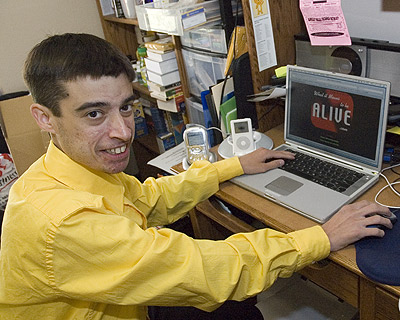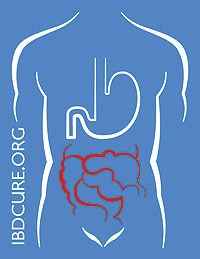Berkeleyan
 |
Berkeley freshman Gideon Sofer, who suffers from Crohn's disease, continues to advocate for a postage stamp that would raise public awareness of inflammatory bowel disease in all its manifestations.(Bonnie Azab Powell photo) |
His health is poor, but his commitment is strong
If a stamp honoring those with IBD is approved, much of the credit will go to Gideon Sofer
![]()
| 04 October 2006
Four months after making an unusual pitch to the U.S. postmaster general, Berkeley freshman Gideon Sofer is making progress in his campaign to authorize a stamp highlighting inflammatory bowel disease (IBD), and in spreading awareness of the disorder.
Last May, New Jersey's Make-a-Wish Foundation made arrangements for Sofer, 22, an avid stamp collector, to meet with Postmaster General John Potter to discuss Sofer's idea for an IBD stamp.
Sofer has Crohn's disease, a chronic intestinal disorder that has landed him in the hospital for months at a time since he was 12. The ailment has, over time, led to the removal of nearly half his gut.
| To learn more: Read more about the IBD stamp campaign at ibdcure.org For information about the Oct. 21 benefit concert for Crohn's disease and the IBD-stamp effort, contact Oren Kroll Zeldin at Berkeley Hillel, 845-7793 |
At the May 25 meeting Potter listened intently to Sofer, and told him that he himself has family members who suffer from a digestive-tract disease. Two days later Potter featured Sofer in his welcome address at the opening of the World Philatelic Exhibition in Washington, D.C.
"Would you be surprised to know that as many people suffer from Crohn's disease as suffer from Parkinson's disease?" Potter asked the audience after introducing Sofer. "Gideon's message to me was [that] we need to do a much better job of communicating. And as somebody who collects stamps, he saw no better vehicle to get the word out than through a stamp."
Sofer couldn't have been more encouraged by Potter's response.
"A lot of what the postmaster general and I spoke about resonated with him because he's dealt with digestive disease in his family and really understands why it is so critical to get the message out," he says. "I think he's really going to play an important role in gaining approval for the stamp."
In support of Sofer's stamp effort and Crohn's disease in general, Berkeley Hillel, the campus's Jewish student center, is hosting a benefit concert the evening of Oct. 21. Performing will be the Afro-Semitic Experience, an ensemble that blends Jewish and jazz musics.
Meanwhile, some Berkeley students with IBD have contacted Sofer to thank him for raising awareness about a disease that nobody likes to talk about: "The stamp campaign is a creative and unique idea for bringing light to a disease that is unfortunately never talked about," one Berkeley student who suffers from ulcerative colitis, a form of IBD, wrote in an e-mail to Sofer.
An interview Sofer did on National Public Radio's All Things Considered inspired Megan Leigh Dorko of Pennsylvania, who has spina bifida, to send Sofer a couple of potential stamp designs.
"I love being a graphic designer, and it's always been a goal of mine to incorporate my design skills with helping others," Dorko wrote in an e-mail to Sofer. "I hope the designs I've done for you can help your cause."
 Design for an IBD stamp by Megan Leigh Dorko. |
Perhaps they will. A meeting of the U.S. Postal Service's Citizens' Stamp Advisory Committee - which counts former Berkeley Chancellor Ira Michael Heyman among its members - is approaching, and Sofer is hopeful that consideration of a stamp highlighting IBD is on the agenda. The committee reviews ideas for new stamps proposed by members of the public and then recommends subjects and designs to the postmaster general. The process is highly confidential.
Although Sofer is making progress with his campaign for a stamp, his health isn't faring so well. Earlier this summer he started taking an experimental drug called Revlimid, a thalidomide derivative, approved for some forms of cancer, that appears to boost the immune system by increasing tumor-attacking white blood cells. He says this has been a welcome change from the thalidomide he had been using, which has toxic side effects.
By all indications, Revlimid appeared to be working for Sofer: he gained weight and started feeling stronger. But when he went to refill his prescription in late August, he was told that his insurance company would no longer pay for his prescription.
"They hired a 'peer clinical M.D.' to review my case, and he deemed that it is not 'medically necessary' for me to take the drug - without ever having seen, met, or spoken to me," Sofer says.
To continue the drug he would have to pay more than $6,000 a month out-of-pocket, which he cannot afford. Though he's appealing the decision, he's been off of the medication for several weeks. Earlier this month, during a painful relapse, he was admitted to the UC San Francisco Medical Center for a one-week stay that arguably cost his insurance company at least half of what it would have paid for a year's prescription of Revlimid.
"Right now I am struggling, both physically and spiritually," says Sofer. Still, he adds, "I'm so lucky to be alive. It's not always easy to tell myself this when I relapse, but that's what really gets me out of bed in the morning, and that's what is motivating me to do whatever it takes to get this stamp approved."

